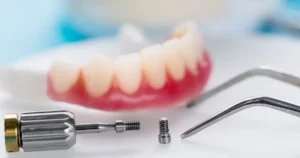Dental implants are an increasingly popular, effective solution for replacing missing teeth, blending in seamlessly with your natural teeth. They are an excellent long-term solution for restoring your smile. Implants have been one of the most significant developments in dentistry in the past 40 years. Dental implants are composed of titanium and other materials compatible with the human body. They are surgically implanted in the upper or lower jaw, acting as sturdy anchors for replacement teeth.
Benefits of Dental Implants
- A permanent solution to tooth loss
- Easy to care for after the procedure
- Enables natural speech
- It matches your natural speech
- No embarrassing slippage
- Prevents bone loss
- It contains changes to facial shape
- Restores bite force
- Supports adjacent teeth
- Won’t give you cavities
Expectation During Healing
After receiving your dental implants, expect some tenderness after the anesthesia wears off. However, this side effect isn’t as manageable as expected. But dentists are likely to recommend that you take an over-the-counter pain reliever for any discomfort felt during the healing process. You must follow any aftercare points distributed by your dentist. This aftercare can include the following:
- Avoid too hot food in the first 48 hours.
- Avoid smoking for at least three (3) days following your surgery.
- Avoid straws for the next 24 hours after your procedure.
- Expect some minor swelling for 2-3 days.
- Stick to liquid diets for the next 24-48 hours.
- The day after your surgery, rinse with salt water 3-4 times daily.
- Use Tylenol for any potential discomfort.
Surgical procedures can be scary because some parts of your body must be cut open. Getting dental implants means your jaw needs to be cut, so it makes sense for many people to be wary about the procedure and the amount of pain it will cause.
How Painful Can The Surgery Get?
One of the biggest reasons many believe dental implant surgery is painful is what they see on the internet. A quick dental implant surgery search will show you plenty of pictures of people getting holes drilled into their gums, which looks scary if you do not know what is happening. But don’t fret; the procedure is not as painful as it seems.
The pain patients feel when they get dental implant surgery is not from the hole made in the bone or the implant placement. The pain typically comes from manipulating soft tissues during the process.
That said, dental implants that do not require lifting the gum tissue are painless, with patients reporting pain levels from one to two after your dental implants. If small flaps of gum tissues are lifted, the pain level is at three or four for the first night and subsides afterward. Regardless of how much gum tissue is raised or if grafting is required, the pain lasts anywhere from one to three days and declines later.
After Your Procedure
After dental implants, you will have difficulty eating regular food as your gums heal, so you will need to eat soft foods for a while. You must also refrain from products containing caffeine and tobacco. Doing so prevents implant failure and other possible complications.
In the long run, you will need to schedule frequent appointments with your dentist so they can make sure you are healing properly and there are no complications from the procedure.
Tips to Reduce Tooth Implant Pain
Dental implants are expensive solutions for replacing missing teeth. This procedure needs surgery to fix the teeth. Compared to other therapeutic approaches like dental crowns and dentures, the implant teeth assure higher success rates and bring back the natural look and performance.
After the implant surgery, the healing period is a vital factor in determining the success of your dental implant. New bones around your implant fixed in the jaw develop as you begin your healing period. The duration persists for months and varies with the complexity of the procedure.
Mild aches and little discomfort are expected during healing or recovery. Surgeons who administer dental implants suggest various pain control measures in the healing period. We have listed them here:
1) Rest entirely and refrain from strenuous activities.
Fixing dental implants need 2-3 days for initial recovery. When we perform any strenuous or challenging actions, it only increases the blood pressure and heart rate. Such an increase in one’s blood pressure from physical activities may dislodge the blood clots formed in the implant site, especially during the initial recovery period.
2) Take medicines and painkillers.
During the period of initial recovery, you will encounter suffering like pain and bleeding. Dentists prescribe medications after dental implant surgeries to get rid of such aches. It would be best to take those prescriptions with the recommended dosage for the first 48 hours.
If you are prescribed antibiotics, don’t take them just for two (2) days. Take it up to the whole course.
3) Apply a cold compress.
As a clinically recognized home remedy for various oral problems, a cold compress is powerful in reducing pain in a tooth and swelling. Take ice compress bags or wrap some ice cubes with gauze or a frozen food bag. Apply it over the mouth on the dental implant fixed region to numb the throbbing tissues, eventually reducing pain.
Keep in mind, however – don’t place ice bags for long periods. Keep cold compress bags for 20 minutes; sand removes them for 20 minutes. Then again, apply it for 20 minutes. Repeat this alternatively after every 20 minutes.
4) Soak your mouth using a solution of lukewarm water and baking soda.
Mouth rinsing with a saltwater solution is similar to traditional remedies. However, you have to soak for a few minutes instead of swishing.
Add a teaspoon of baking soda to a cup of lukewarm water, stirring it well. Pour it into your mouth afterward, then leave it for a few minutes. This solution removes the microorganisms that induce pain and takes care of minimizing pain in the implant-fixed teeth.
5) Abandon the habit of smoking.
Smoking harms dental implants and their site more than natural teeth. May it be smoking or chewing tobacco, consuming any form of tobacco after getting implants is a prime reason for implant failure. The toxic particles in tobacco annoy the injured gum tissues in the implant site and delay the healing process. It prevents the growth of gums around the implant posts.
6) Switch to soft foods.
Adjusting your diet is also indispensable for faster recovery and pain reduction in the implants. Don’t take hard and chewing foods like chewing gums or hard candy during recovery. It is because the frequent chewing and the excess pressure on the dental implants weaken the anchor support.
The Bottom Line
Dental implants done surgically can be painful depending on how healthy your gums are. To know more about how much the procedure pain will be, talk to your dentist and have them examine your gums to determine how much work they will have to do.
Are you ready for your dental implant surgery? Our awesome friends at Couture Dentistry can help you today. Visit them today!


